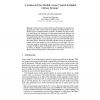Free Online Productivity Tools
i2Speak
i2Symbol
i2OCR
iTex2Img
iWeb2Print
iWeb2Shot
i2Type
iPdf2Split
iPdf2Merge
i2Bopomofo
i2Arabic
i2Style
i2Image
i2PDF
iLatex2Rtf
Sci2ools
102
Voted
DBSEC
2006
2006
A Framework for Flexible Access Control in Digital Library Systems
Traditional access control models are often found to be inadequate for digital libraries. This is because the user population for digital libraries is very dynamic and not completely known in advance. In addition, the objects stored in a digital library are characterized by fine-grained behavioral interfaces and highly-contextualized access restrictions that require a user's access privileges to be updated dynamically. These motivate us to propose a trust-based authorization model for digital libraries. Access privileges can be associated with both objects and content classes. Trust levels associated with these specify the minimum acceptable level of trust needed of a user to allow access to the objects. We use a vector trust model to calculate the system's trust about a user. The model uses a number of different types of information about a user, for example, prior usage history, credentials, recommendations etc., to calculate the trust level in a dynamic manner and thus ach...
Related Content
| Added | 30 Oct 2010 |
| Updated | 30 Oct 2010 |
| Type | Conference |
| Year | 2006 |
| Where | DBSEC |
| Authors | Indrajit Ray, Sudip Chakraborty |
Comments (0)

